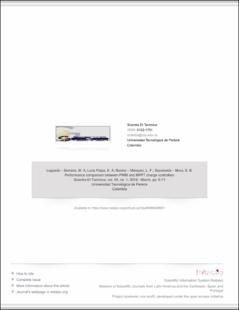Performance comparison between PWM and MPPT charge controllers
Comparación del desempeño entre un controlador de carga PWM y un controlador MPPT
Artículo de revista
2019-03
Scientia et Technica
Colombia
Charge controllers are implemented in several
electronic systems to protect and control the charge and discharge
rates of a battery; for off-grid Photovoltaic (PV) systems, there are
two types of technologies, Pulse Width Modulation (PWM) and
Maximum Power Point Tracking (MPPT). In this work, we
compared two charge controllers in PV systems with the same
technical specifications in order to determine the behavior of each
of them under similar environmental conditions. The
implementation of both charge controllers was based on firmware
and hardware with original designs, using PWM and MPPT
technologies. Both PV systems are composed of the charge
controller, a 30 W solar panel and a 12 V – 18 Ah battery; in the
experimental tests we measured the voltage and current in the
panel and the battery in charge and discharge processes, observing
that the MPPT controller has a higher average efficiency than the
PWM controller, elucidating that the type of technology used in
the charge controller has a direct impact on the efficiency, even
under unfavorable conditions of solar radiation and
environmental temperature. The PWM controller is an option of
acceptable efficiency and lower price in relation to the MPPT
controller. In the implementation of both controllers we calculated
similar periods of autonomy. Los controladores de carga son implementados en
varios sistemas electrónicos con el objetivo de proteger y controlar
la carga y descarga de una batería; en el caso de los controladores
utilizados en sistemas fotovoltaicos autónomos se implementan dos
tipos de tecnologías, Pulse Width Modulation (PWM) y Maximum
Power Point Tracking (MPPT). En este artículo se compararon
dos controladores de carga con diseños originales en sistemas
fotovoltaicos con las mismas especificaciones técnicas para
determinar el comportamiento de cada uno bajo condiciones
ambientales similares. La implementación de ambos controladores
de carga se basó en software y hardware con diseños originales,
utilizando tecnología PWM y MPPT. Ambos sistemas están
compuestos por el controlador de carga, un panel solar de 30 W y
una batería de 12 V a 18 Ah; se realizaron las pruebas
experimentales de ambos controladores midiendo voltaje y
corriente en el panel y en la batería en procesos de carga y descarga, observando que el controlador MPPT tiene una
eficiencia promedio mayor que el controlador PWM debido a que
el tipo de tecnología implementada influye directamente en la
eficiencia, incluso ante valores menos favorables de radiación solar
y temperatura ambiente. El controlador PWM es una opción de
eficiencia aceptable y además de bajo costo respecto al controlador
MPPT. En la implementación de ambos controladores se
calcularon tiempos de autonomía similares.
Descripción:
Performance comparison between PWM and MPPT charge controllers.pdf
Título: Performance comparison between PWM and MPPT charge controllers.pdf
Tamaño: 765.3Kb
 PDF
PDF
 LEER EN FLIP
LEER EN FLIP
Título: Performance comparison between PWM and MPPT charge controllers.pdf
Tamaño: 765.3Kb
 PDF
PDF
 LEER EN FLIP
LEER EN FLIP
















